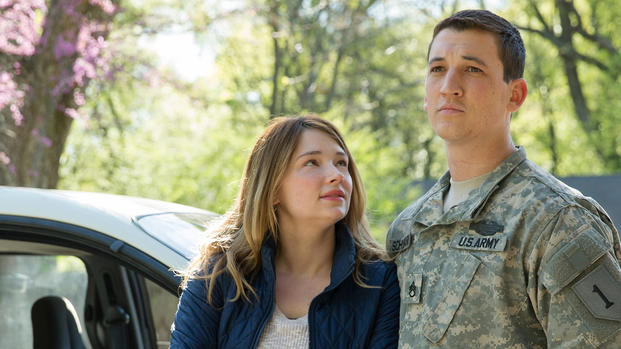Sometimes seeing a movie becomes an out of body experience. You're sitting there in the theater and you realize "Oh hey -- this is a movie about me."
That's how I feel about "Thank You for Your Service."
Based on a true story told in the book of the same title, "Thank You for Your Service" details the homecoming and reintegration struggles of post-traumatic stress disorder (PTSD) and traumatic brain injury (TBI) faced by a trio of soldiers returning from Iraq in 2007. It looks at the soldiers, their families and how they fit back into regular life while carrying the baggage of what they experienced over deployment. It follows them as they move through the Department of Veterans Affairs and work to fit back into the rhythm of their families.
I am not a veteran. I have never served in uniform. But, like some of the women portrayed in this film, I am the wife and, by extension, the caregiver of an Army infantry combat veteran who has struggled with PTSD and daily deals with TBI. What I am about to tell you is from that perspective.
Who Should See "Thank You for Your Service"
I would carefully consider whether or not seeing this movie in the theater with a combat veteran is a good move. We tend to think of "trigger warnings" are for "snowflakes" or the weak, but sometimes they really are warranted. This is one of those times.
This film graphically and, based on what I've observed in my own home, accurately depicts struggles with suicide, common PTSD symptoms like nightmares and flashbacks and TBI. Make sure that you can handle watching someone deal with that before you head to the theater where everything on screen is so much larger than life. My husband will probably see this movie, but we'll wait to watch it at home.
The film also graphically and, again, based on my own experience, accurately depicts what it is like to live with someone who is coming to grips with PTSD and TBI. Make sure you're OK seeing those realities on the big screen.
Related: 'Thank You for Your Service' Has a Message for America
It was very emotional for me -- much more so than I anticipated. I felt like I was watching a movie about myself. How did they know these things? How did someone who isn't me know all of those moments, or moments eerily similar?
Seeing this movie, however, could be helpful for a veteran who is in the midst of figuring out that, yes, he or she really does need help. While not every circumstance in the movie has a happy ending, it is, ultimately, a story of redemption as the characters figure out how to move forward.
And it could be helpful or comforting if you are a spouse or caregiver in the middle of the journey. Guess what? You're not alone. That's how they know about all of this stuff. Other people deal with it, too.
If you're a non-military member or someone trying to understand how combat could be impacting a veteran, this movie is perfect for you. While not all veterans deal with these things, it's a great reminder that sometimes everything can seem right from the outside, but there's more than meets the eye.

Miles Teller and Beulah Kole wait (and wait some more) at the VA in "Thank You for Your Service."
Does It Spread 'Broken' Veteran Stereotypes?
There's been a lot of concern that movies like this, which focus on veterans who are injured, do the vast majority of veterans a disservice by reinforcing negative stereotypes. We've worked hard as a military community to make sure civilians know that most veterans aren't "broken" or 25 seconds from death by suicide or some kind of breakdown. Student Veterans of America says that this film sets us back 10 years in the fight to make sure people know most vets are fine.
As a non-veteran I can't comment on the accuracy of this film's depiction of the veteran experience. But I do think it's important for Americans to know that sometimes there really are internal injuries that you cannot see, and that veterans need help getting care.
I also think we underestimate the intelligence of viewers when we say that a film about three individuals will make everyone think that all soldiers are about to snap.
"Thank You for Your Service" in no way insinuates that these three soldiers are representative of all service members.
Could we use a movie about veterans who aren't struggling with this stuff? Sure. Someone please make one.
But "Thank You for Your Service" is a movie about my experience and my home -- and the experience of many others. Viewers should have the opportunity to understand that view, too.





